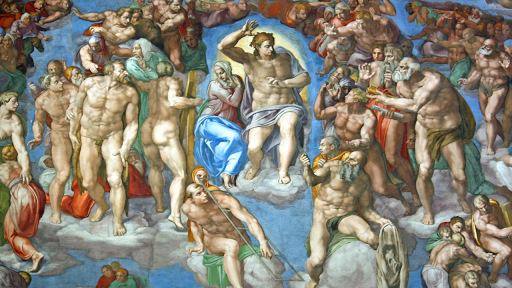
November 22, 2020; Matthew 25:31-46; Christ the King
We are all familiar with the great Last Judgement scene from Matthew’s Gospel. Jesus comes at the end of time and separates people into two groups, like a shepherd separating the sheep from the goats. The sheep go to eternal life and the goats to punishment. But the most important thing about this gospel passage is that it gives us the criterion on which that division is going to take place. It will be determined by how much we serve Jesus who is present in the hungry, the thirsty, the stranger, the naked, the sick, and the imprisoned. When you and I look at that list, we probably say to ourselves that we are doing rather well. After all, if we meet a starving person, we will give him or her a sandwich. If people we know are sick, we visit and care for them. It is not all that often that we run into strangers or prisoners. So, all in all, we are probably confident that we will be counted among the sheep.
But there is one word in today’s gospel that can radically change that perspective. Did you notice what that word was? Listen again: “When the Son of Man comes in his glory, and all the angels with him, he will sit upon his glorious throne, and all the nations will be assembled before him. The word is “nations.” Who is assembled before the king? All the nations. This text is telling us that we will not simply be judged as individuals. We will be judged as a nation. We will be judged not only for what we do or do not do, but what our country does or does not do for those in need. That is a significant difference.
When Jesus comes on the last day, he is not just going to ask us whether we gave a sandwich to the hungry person that knocked on our front door. He is going to ask why in 2019, in the wealthiest country on Earth, there were 30 million Americans who did not have sufficient nourishment. This year, because of Covid, that number is pushing 50 million. 17 million are children.
When Jesus comes with all the angels, he is not just going to ask if we mistreated a stranger at work or at school. He is going to bring up our national policy on immigration, a policy that the United States bishops have termed as “broken.” Our bishops have called for reforms, so that immigrant families will not be separated from one another and a legal path to citizenship be established for the undocumented who are already working in our country.
When Jesus takes his seat on his glorious throne, he is not just going to ask us whether we cared for our elderly parents or visited Aunt Louise in the hospital. He will want to know why 12.5% of Americans have no access to health care and 30.8% have insufficient access. That means that over 43% of Americans do not have the resources to fully address needs of sickness and disease.
When Jesus comes at the end of time, he is not simply going to ask us whether we once hired somebody who had a prison record. He will want to know why there are more imprisoned people in the United States than any other country, and why our programs for rehabilitation of those prisoners are so weak that over 80% of those released return to prison.
So, if you’ve been keeping score with me, our presence among the sheep is becoming somewhat tenuous. Now of course, none of us as individuals can change national policy with a snap of our fingers. But today’s gospel insists that our concern for those who are in need must extend beyond the circle of our immediate family and friends. Our responsibility to care for the most vulnerable members of society is woven into the gospel. This is why we as Christians must do our best to stay informed of these social realities and use whatever political leverage we have to shape policies that will meet the basic needs of the least among us.
The gospel today has warned us to be ready, because when Jesus comes on the last day, he is not just going to ask about you and me. He is going to ask about America.

This is spot on George! We need to wake up in America.
Living with CHRIST is my reference to your articles… Always interesting and inspiring!!!